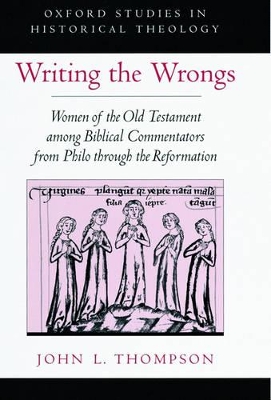Oxford Studies in Historical Theology
1 total work
The last third of the 20th century has witnessed an eruption of interest in the women in the Bible. In this field, Phyllis Trible's Texts of Terror is a landmark among those studying women of the Bible. Focusing on stories of the maltreatment of women, Trible paved the way for subsequent feminist exegetes who have been very critical of such stories in the Bible, and who see Christianity as an irredeemably patriarchal religion. It is commonly said that these
Old Testament stories of rape, murder, torture, and abandonment passed without comment until recent times. In this book, however, John Thompson points out that many neglected pre-modern Christian interpreters have wrestled with the texts of terror throughout the centuries, sometimes writing volumes 'between
the lines' of scripture out of an apparent concern for the women in these stories. Thompson traces and analyses the interpretation of the stories of Hagar, Jephthah's daughter, the Levite's wife, and Lot's daughters from the earliest Church Fathers through to the Reformation. He argues that the neglected and largely inaccessible commentaries on which he draws not only shed light on how these troubling stories have been seen in the past, but can speak to Christians who are battling over how the
Bible ought to be read today. Here, Thompson traces and analyses various Christian interpretations of these Bible stories of women. In drawing attention to views other than Texts of Terror, Thompson speaks to Christians who are battling over how the Bible ought to be read today.
Old Testament stories of rape, murder, torture, and abandonment passed without comment until recent times. In this book, however, John Thompson points out that many neglected pre-modern Christian interpreters have wrestled with the texts of terror throughout the centuries, sometimes writing volumes 'between
the lines' of scripture out of an apparent concern for the women in these stories. Thompson traces and analyses the interpretation of the stories of Hagar, Jephthah's daughter, the Levite's wife, and Lot's daughters from the earliest Church Fathers through to the Reformation. He argues that the neglected and largely inaccessible commentaries on which he draws not only shed light on how these troubling stories have been seen in the past, but can speak to Christians who are battling over how the
Bible ought to be read today. Here, Thompson traces and analyses various Christian interpretations of these Bible stories of women. In drawing attention to views other than Texts of Terror, Thompson speaks to Christians who are battling over how the Bible ought to be read today.
